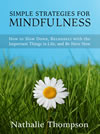 Meditation is a wonderful tool for decreasing feelings of stress and anxiety, and increasing feelings of peacefulness, contentedness and connectedness. It helps you stay present in the moment so that you can experience your life as it happens, rather than always being caught up in the past or the future, and can help you gain a deeper understanding of Who You Really Are. And yet, for so many people, starting a regular meditation practice is a frustrating and difficult task. So today I’m going to give you 10 meditation tips for beginners to help you get started with it all.
Meditation is a wonderful tool for decreasing feelings of stress and anxiety, and increasing feelings of peacefulness, contentedness and connectedness. It helps you stay present in the moment so that you can experience your life as it happens, rather than always being caught up in the past or the future, and can help you gain a deeper understanding of Who You Really Are. And yet, for so many people, starting a regular meditation practice is a frustrating and difficult task. So today I’m going to give you 10 meditation tips for beginners to help you get started with it all.
Simple meditation tips for beginners
Here are some simple meditation tips for beginners to help you get started with your own meditation practice:
Tip #1: Make it a habit.
The best way to make progress with meditation and really get it to start working for you is to turn it into a habit. Make it a formal practice with time that you dedicate specifically to meditation in your schedule. Do it at least once a day – twice if you are able to manage it.
Tip #2: Start small.
Don’t listen to people who tell you meditation doesn’t count unless you do it for half an hour at a time. Maybe you’ll get to the stage where you want to do it for that length of time, but don’t start out trying to force yourself to be still for that long. Try five minutes at first, and then when you’re comfortable with that, work your way up in five-minute increments until you get to a practice length that feels right for you.
Tip #3: Guard your time.
Make sure that you dedicate a time for meditation when you know you won’t be disturbed. You’re not going to be able to still your mind if you’re thinking that the kids will be home soon, or that the baby will wake from her nap soon, or that you have a board meeting in an hour and you’re expecting your secretary to bring you the agenda for approval any minute now. Pick a time in your day when you know you will have the undisturbed time that you need.
Tip #4: Try stretching.
If you’re new to meditation, doing some light stretches before beginning your meditation practice can help you loosen up any muscle tension that might make sitting still for a while uncomfortable for you. Stretching also helps you bring your focus inward and helps centre you.
Tip #5. Pick a comfortable position.
A lot of the experts out there are going to tell you to sit in a straight-backed chair with your feet flat on the floor, or to kneel with a cushion tucked under you for support. And I’m sure you’ve seen all the pictures of yogis and swamis in full lotus position while they meditate. But if you’re not comfortable in such positions then try something else – I prefer to lie flat on my back on something comfortable, or to sit on a comfy couch with my legs crossed and my back supported. The key is to find something that feels comfortable for you and your body, or you’re just not going to keep at it. It’s not the position you’re in that’s important here, it’s the stillness and quieting of the mind that is important.
Tip #6: Set your intention.
Before you begin your meditation practice, set your intention for the practice; what is it that you want to get out of this meditation session? Is it clarity? Is it relaxation? Peace? Connection? Set your intention before you start so that your subconscious mind knows what to work on.
Tip #7: Focus on your breath.
If you’re just starting out with meditation, focus on your breathing. Count your breaths as the flow in and out, and slow your breathing down. Breathe deeply. It slows your heart rate and helps you to relax. It also helps to focus your mind so that your random thoughts are less likely to intrude.
Tip #8: Don’t stress over it.
If you start to get frustrated because your mind keeps wandering and can’t seem to focus yourself very well, don’t stress over it. This is normal when you begin meditating – it really is very common, and nothing to be concerned about. When you feel the frustration creeping in, just bring your awareness back to your breaths and start counting them again. You can try using breath patterns, if it helps (for example, instead of every breath in as one and every breath out as another one, count cycles; one breath in and one breath out is one, another breath in and out is two, etc…)
Tip #9: Practice gratitude.
At the end of your practice, take a minute or two to focus on gratitude, and appreciate your ability to practice, and your mind’s ability to remain focused during that practice (even if you had troubles staying focused, there were moments when you were focused, remember). Gratitude and appreciation and the cornerstones to building everything you want in life, including a beneficial meditation practice.
Tip #10: Be present throughout the day.
Even if it’s not your set “meditation time”, finding moments throughout your day to practice mindfulness and being fully present in the moment is a great way to strengthen and build your meditation habit and abilities.
So there you have it: 10 meditation tips for beginners! When you start meditating, you will realize very quickly just how busy your mind is all the time. The thoughts never stop… they are a constant stream going through your head, most of which you don’t notice because they are going by so fast, but when you start meditating and start trying to quiet your mind, you will very definitely become aware of just how many thoughts are racing around your head. Don’t beat yourself up over all of this. With practice, you will learn to deflect these thoughts and “quiet the chattering monkeys” so that you can find the inner calmness that you’re looking for. It does get easier the more you do it…

















This is great, Nathalie, thanks! I always wonder of I am sitting in the right position or whatnot when I meditate.
Going through this list, it occurred to me that this is also a list to kind of lead one’s life, right?
I am also wondering if you can talk about miracles at some point. Like, what they really are, the fact that they are totally possible and why people consider them to be impossible when they really are.
I used to worry about being in the right position and such, but then I just realized how ridiculous it was to make myself uncomfortable while trying to still my mind. It just never worked for me. Much better to make the body comfortable so that the mind isn’t distracted by discomfort and focusing on that. Yes, you can certainly use these tips as “life tips” as well as just meditation tips. Everything ties in together… connectedness in all things, remember.
And yes, I will add miracles to my topics list for you. 😉
I completely agree, Natalie, that meditation isn’t always about being in the right position in the perfect place. It’s about being able to focus inward on your thoughts, which is very difficult to do if you are in an uncomfortable position or place. As you mentioned, stretching seems like a very good way to loosen muscles, thereby preventing any physical tension that might deter internal reflection. Meditation is about removing distractions and stress, so stressing over form is ironic.
Hello Audrey — welcome to Vibe Shifting, and thank you for commenting. 🙂 When I first started out with meditation, I tried the standard stuff, but my neck and back would get so sore from trying to sit in a straight-backed position, that the discomfort was all I could concentrate on. When I told myself “enough of this nonsense” and did it my own way, that’s when I started to see results, and to understand the benefits that could come from the practice. I absolutely agree that the focus should be on looking inward and finding your centre and your stillness, rather than fretting about whether you’re “doing it right”.
Since the dawn of religion, meditation has been a spiritual practice that has brought solace, comfort and meaning to its practitioners. Thank you Nathalie.
Hello Mira, and welcome to Vibe Shifting! Glad you enjoyed the article. 🙂